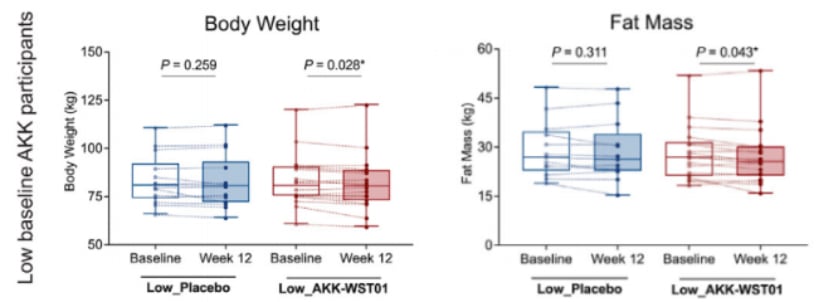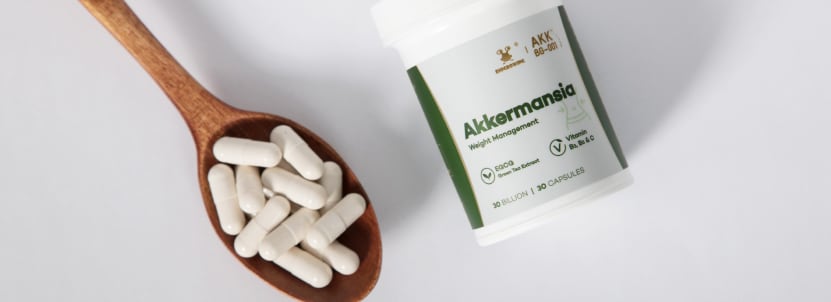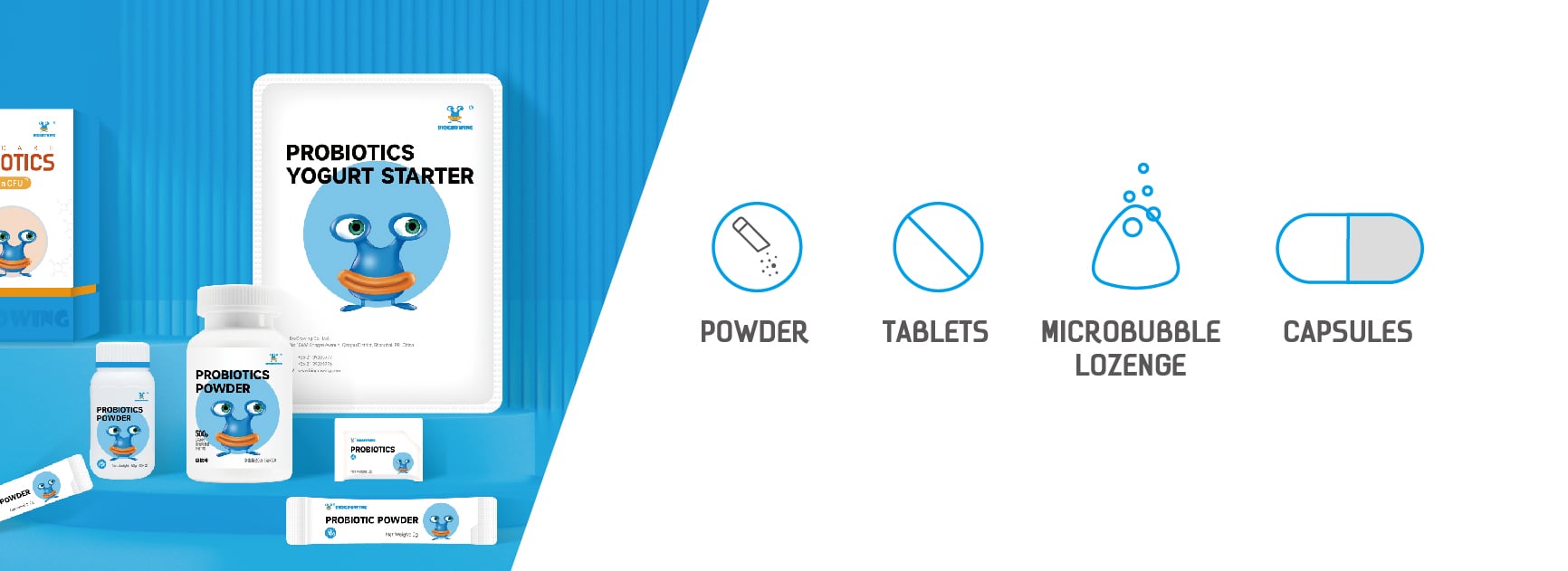The global metabolic health landscape is facing an unprecedented crisis.
According to the World Obesity Federation, by 2030 1.3 billion people will be affected by obesity, creating an economic burden of $3.32 trillion and crippling productivity.¹ According to the International Diabetes Federation, 589 million adults worldwide were living with diabetes in 2024. Globally, diabetes and its complications caused over 3.4 million deaths in 2024, with nearly 40% among working-age individuals.²
This crisis is fueled by a vicious cycle of obesity and type 2 diabetes, driven by gut microbiota dysbiosis, which compromises intestinal barrier function and promotes systemic inflammation. Although GLP-1 agonists (e.g. semaglutide) show efficacy, they face limitations: high cost, limited access, and gastrointestinal side effects – such as weight regain – that undermine long-term adherence.
These challenges highlight an urgent need for safe, effective, and accessible non-pharmaceutical interventions targeting the root causes of metabolic dysfunction.

Akkermansia muciniphila: The next-generation probiotic
Akkermansia muciniphila (AKK) is a bacterium naturally present in the gut of healthy individuals, comprising approximately 0.5% to 5.0% of the total gut microbiota. AKK exerts its beneficial effects through specific effector molecules such as the SCFAs, Amuc_1100 protein and Protein 9 that contribute to weight loss, reduction of fat mass and blood glucose levels, enhanced thermogenesis, and improved gut barrier function.
It was first discovered in 2004 by Dutch researchers Muriel Derrien and Willem de Vos. In 2022, AKK was widely recognized as a ‘next-generation probiotic’ for its validated role in metabolic and intestinal regulation, and the European Union authorized the commercial use of pasteurized Akkermansia muciniphila.
The scientific interest in AKK has grown substantially from 2010 to 2024, with over 30,000 publications highlighting its role in metabolic health, obesity, diabetes, and gut microbiome research.³ Not only in the academic field, AKK has also attracted extensive market investment.
According to a report by QYResearch, the global AKK probiotics market achieved an impressive sales revenue of RMB 325 million in 2024. Looking ahead, its sales are projected to climb to RMB 638 million by 2031.⁴ Overall, the market’s future prospects remain highly optimistic.

From scientific promise to industrial reality
Capitalizing on these scientific insights, BioGrowing – a leading Chinese probiotics innovator – has introduced two distinct, science-backed solutions featuring AKK.
The live strain, AKK WST01, developed by Shanghai SPH Sine Pharmaceutical Co., Ltd., is supported by a 12-week randomized, double-blind, placebo-controlled trial in overweight/obese type 2 diabetics, showing that daily supplementation significantly reduced HbA1c (-0.57%), body weight (-1.20 kg), BMI (-0.43 kg/m²), visceral fat mass (-0.13 kg), and LDL-C (-0.22 mmol/L), while enhancing fat oxidation rate and insulin sensitivity, especially in low baseline AKK participants.⁵

Zhang et al., 2025, Cell Metabolism 37, 1–14
The AKK WST01’s genome contains both the Amuc_1100 and Protein 9 genes, which can be functionally expressed. The Amuc_1100 protein can interact with Toll-like receptor 2 to promote GLP-1 release, while Protein 9 can bind with ICAM-2, facilitating direct contact with L-cells for GLP-1 secretion.
Additionally, P9 stimulates macrophages and/or intestinal epithelial cells to secrete IL-6, further promoting GLP-1 production. GLP-1 (Glucagon-like peptide-1) is a crucial hormone that regulates blood sugar by stimulating insulin release and suppressing glucagon, while also promoting weight loss by delaying gastric emptying and reducing appetite.
These mechanisms make GLP-1 effective in treatments for type 2 diabetes and obesity. During the trial, daily oral administration of the WST01 strain for three months was found to be safe and well-tolerated in overweight/obese individuals with type 2 diabetes. Throughout the clinical study, no adverse events related to the administration of WST01 bacteria were observed.
This robust clinical profile of AKK WST01 is underpinned by its study’s publication in top-tier journal Cell Metabolism and achievement of Self-GRAS status. To date, the strain has obtained patents in 13 countries and regions, underscoring its safety and innovative status.
To overcome application limitations in various product formats, BioGrowing developed AKKBG-001, an inactivated strain.
“This strain originates from healthy human sources in Kashgar, Xinjiang, and has been confirmed through whole-genome sequencing to lack resistance and virulence genes, ensuring high safety,” says Dr. Peng Guo, Chief Scientist at BioGrowing.
“Produced via proprietary anaerobic fermentation and high-fidelity inactivation, AKKBG-001 is a pure, stable bacterial powder resistant to heat, acid, and oxygen, enabling incorporation into diverse product formats. Preclinical evaluation had demonstrated that it can result in 50% inhibition of fat absorption comparable to the high-fat diet model group, reduce fat mass by approximately 40% compared to the control group, enhance energy metabolism, and repair gastrointestinal mucosal damage,” adds Dr. Guo.
Notably, the study published in 2019 in Nature Medicine confirmed that pasteurized (inactivated) AKK retains efficacy, providing strong theoretical support for the use of inactivated formats like AKKBG-001 – which may even exhibit superior stability and application potential compared to live bacteria.⁶
Two decades of pioneering probiotic innovation with a global impact
This dual approach – leveraging both a clinically validated live bacterium and a robust, application-friendly postbiotic – enables global brands to create effective, accessible, and diverse products targeting metabolic health.

BioGrowing’s innovations are already catalyzing a new generation of health products. With WST01, it is expected to see high-potency dietary supplements (capsules, powders) in the near future.
For AKKBG-001, BioGrowing has already achieved large-scale production of 300-billion TFU, high-purity AKKBG-001 capsule products and introduced standardized samples for weight management, combining EGCG green tea extract, L-theanine, and vitamins B and C for synergistic effect. This strain’s possibilities are endless: coffees, ready-to-drink beverages, and even confectionery products, delivering metabolic benefits without compromising on taste or texture.
“We plan to launch new products containing the live strain AKK WST01, incorporating the concept of precision nutrition to meet consumers’ personalized health needs,” adds Dr. Guo.
“At the same time, we will further advance the development of more application formats for inactivated AKK, integrating probiotics into daily diets to provide more convenient and enjoyable health support.”
Underpinning these offerings is BioGrowing’s ‘Six-Diamond Probiotics Standard’, a rigorous framework ensuring excellence in Efficacy, Verification, Production, Activity, Safety, and Purity. For over 20 years, BioGrowing has stood as a pioneer in global probiotic industry.

With a portfolio encompassing both single-strain and customized multi-strain formulations, the company supplies foundational solutions for final finished products across the health and functional food sectors. Its flagship Flora-Focus Series targets nine health domains including gut health, oral health, immune modulation, weight management, feminine care, skin health, blood glucose regulation, blood pressure improvement, and H. pylori inhibition.

BioGrowing’s products are sold to more than 80 countries, supported by a formidable in-house culture collection of over 50,000 strains – a testament to its scientific legacy and commitment to microbial research and development. One notable star strains is Lactiplantibacillus plantarum Lp‑G18, recognized for its broad range of functions such as immune regulation, blood lipid modulation, and improvement of Helicobacter pylori infections in clinical settings.
This cutting-edge probiotic has earned four major international awards, including a Top 3 spot in the ‘Microbiome Modulation Ingredient of the Year’ category at the NutraIngredients-Asia Awards.
Also noteworthy is Lacticaseibacillus paracasei LPc‑G110, which exhibits significant anti-inflammatory effects – downregulating cellular inflammatory cytokines and suppressing inflammation in oral fibroblasts.
A clinical study conducted at a leading dental academic center in the Netherlands confirmed its oral benefits. This strain is incorporated into BioGrowing’s innovative OralBubble product: a sucrose-free, probiotic microbubble lozenge that addresses eight major oral health concerns, including dental caries, halitosis, and plaque, etc.
Other standout strains include:
- Lactobacillus crispatus Lc-G22 Isolated from the vaginal tract of a healthy woman, it helps maintain vaginal pH balance and reduces the recurrence of vulvovaginal candidiasis.
- Weizmannia coagulans BC-G44 Valued for its heat resistance and ability to enhance immunity, as demonstrated in animal studies. Furthermore, both the bacterial strain and its supernatant have been shown to exert immunomodulatory effects, broadening its application potential. Its safety has been certified via Self-GRAS.
- Lactobacillus gasseri LG-G12 Shown to significantly increase brown fat tissue, making it a promising ingredient for weight management solutions.

Through its science-driven approach and extensive strain library, BioGrowing, as one of Asia’s largest production bases, leverages advanced R&D and industrial capabilities to innovate in probiotic industry.
With a diverse portfolio spanning probiotic powders, starter cultures, and functional applications across food, medicine and healthcare, daily chemicals, aquaculture, and many other fields, the company delivers rigorously studied, clinically supported ingredients and health solutions.
BioGrowing will continue to exemplify the shift from symptomatic treatment to proactive, microbiome-powered health, enabling millions worldwide to access natural, evidence-based solutions tailored for modern health needs.
References
- World Obesity Day.
- IDF Diabetes Atlas.
- W, Yanan.; et al. Bibliometric analysis of research trends and prospective directions of akkermansia muciniphila from 2010 to 2024. Frontiers in Microbiology. 2025; vol. 16.
- QYR Research. Probiotic solid beverages report 2024.
- Z, Yifei.; et al. Akkermansia muciniphila supplementation in patients with overweight/obese type 2 diabetes: Efficacy depends on its baseline levels in the gut. Cell Metabolism. 2025; vol. 37, no. 3.
- D, Clara.; et al. Supplementation with Akkermansia Muciniphila in overweight and obese human volunteers: A proof-of-concept exploratory study. Nature Medicine. 2019; 25(7).


